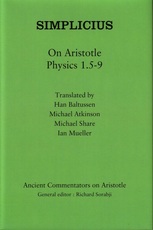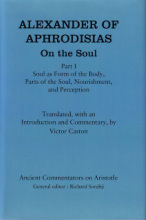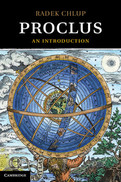|
100 volumes have now been sent to press and will hopefully be published by the end of this year. The 100th volume - now being checked in proof - is Carlos Steel's translation of Ps.-Simplicius, On Aristotle On the Soul 3.6-13 (details on Amazon). This is the fourth and final volume of translation of this commentary; indeed it completes the translation of the entire ancient body of commentaries on the De Anima. It is fitting that Carlos Steel should be completing the task of translating Ps.-Simplicius in DA given that he (with Fernand Bossier) was one of the first to challenge its traditional attribution to Simplicius, proposing Priscian of Lydia as the author. Steel considers afresh the question of authorship in the introduction to this new volume.
Richard Sorabji discusses the Ancient Commentators on Aristotle with Peter Adamson in the latest episode of Peter's History of Philosophy Without any Gaps podcast. Now that Peter is well into the philosophy of late antiquity his series includes number of relevant episodes, including Alexander of Aphrodisias, Porphyry, Proclus, and Philoponus.
Robert Todd's Themistius, On Aristotle Physics 1-3 has recently been reviewed at Notre Dame Philosophical Reviews, which is is described as "an especially welcome addition to the Ancient Commentators on Aristotle Series". Read the full review here.
The latest issue of Classical Review (62/2, 2012) contains reviews of two recent volumes in the ACA series: Wilberding's Porphyry, To Gaurus (review here - "a very useful and timely contribution to scholarship") and Huby and Taylor's Simplicius, On Aristotle Physics 1.3-4 (review here - "this book is an extraordinarily useful tool for scholars").
A new edition with French translation of Calcidius' Commentary on the Timaeus has recently been published by Vrin and has now been reviewed at Bryn Mawr Classical Review. The reviewer reports that an English translation is currently being prepared for the new Dumbarton Oaks Medieval Library.
Peter Adamson's podcast series The History of Philosophy Without Any Gaps continues into late ancient philosophy with a podcast on the Neoplatonist and Aristotelian commentator Porphyry.
 We are delighted to announce the publications of another new volume this month, bringing our total to 92 volumes. Details at Amazon. Description: Simplicius' greatest contribution in his commentary on Aristotle on Physics 1.5-9 lies in his treatment of matter. He starts with a valuable elucidation of what Aristotle means by 'principle' and 'element' in Physics. Simplicius' own conception of matter is of a quantity that is utterly diffuse because of its extreme distance from its source, the Neoplatonic One, and he tries to find this conception both in Plato's account of space and in a stray remark of Aristotle's. Finally, he rejects the Manichaean view that matter is evil and answers a Christian objection that to make matter imperishable is to put it on a level with God.  The latest volume in the series to be published is Victor Caston's translation of the first part of Alexander of Aphrodisias' On the Soul. This is the 91st volume in the series and is another step towards 100 volumes published by the end of 2012. Details at Amazon. Description: Around 200 AD, the greatest defender and interpreter of Aristotle within his school, Alexander of Aphrodisias, composed his own book 'On the Soul', partly following the pattern of Aristotle's. In the first half, translated in Part I, he discusses the soul as the form of the body, and the idea of parts or powers that constitute the soul of living things, including the two lowest powers: nutrition and perception. In the second half, to be translated in Part II, he discusses perception, representation, desire, understanding and - a Stoic term - the governing part of the soul. He takes the soul to consist of these powers, which supervene on the mixture of the body's elemental ingredients, just as inanimate powers like buoyancy or lightness can supervene on other qualities. The supervening powers are newly emergent and the soul's powers do not belong to the constituent ingredients of the body. Through his notion of supervenience, he seeks to steer between the Platonic dualism of soul and body and the materialism of his Stoic rivals. A review of Ian Mueller's translation Simplicius, On Aristotle On the Heavens 1. 3-4 has recently been posted on Bryn Mawr Classical Review, available here. The BMCR archive includes many other reviews of volumes in the series, listed here.
 Cambridge University Press have recently published a new book on Proclus, by Radek Chlup. Full details here. There is also a Google preview here. |
Archives
August 2022
Categories |
 RSS Feed
RSS Feed
